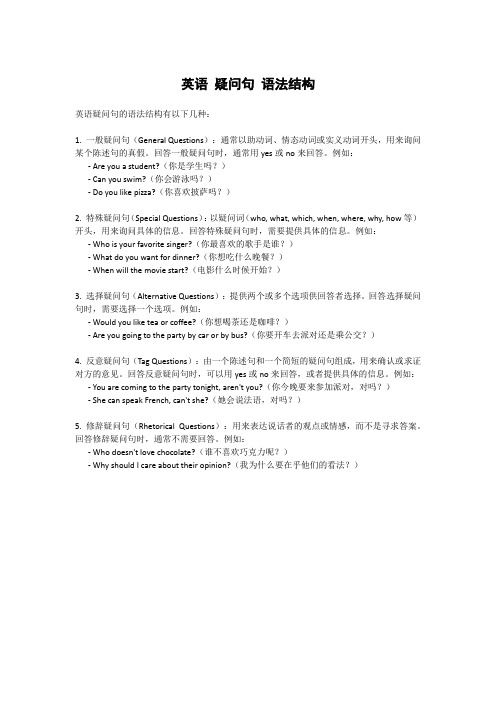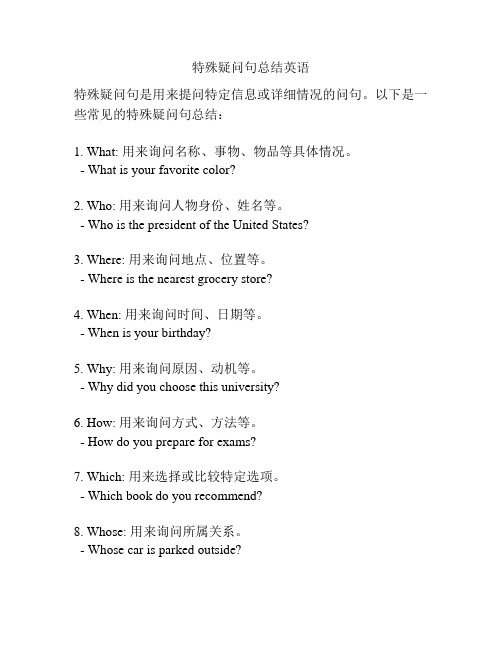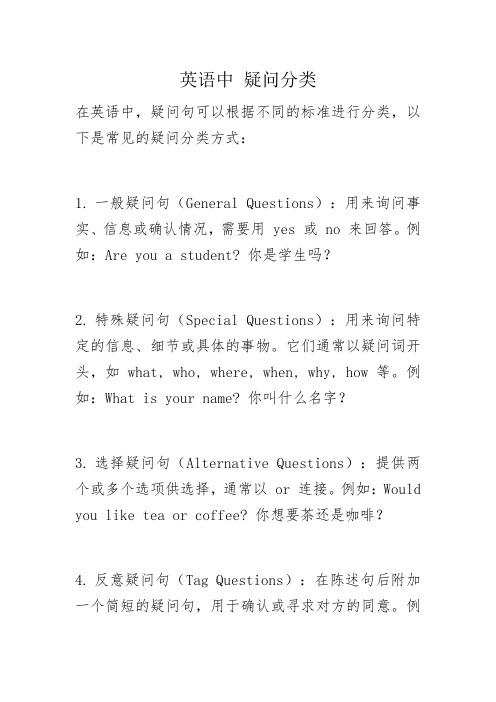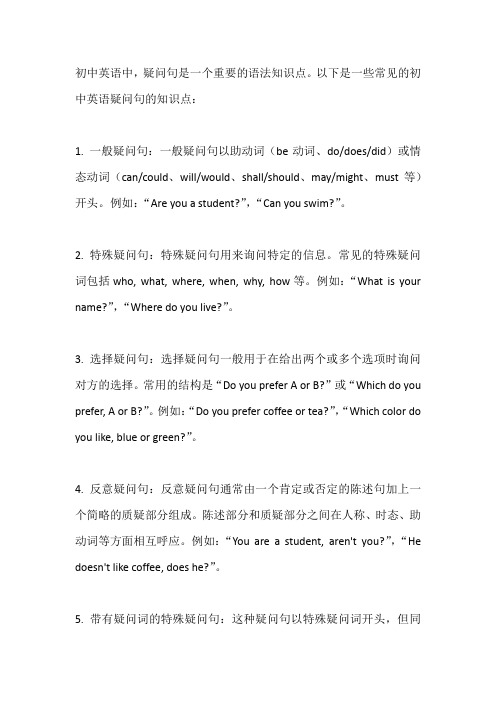英语常见疑问句
中考英语常用特殊疑问句总结

中考英语常用特殊疑问句总结一般(特殊)疑问词仅供参考总结: when什么时候who谁whose谁的where在哪里which哪一个why为什么what什么what time什么时间what colour什么颜色what about怎么样what day星期几what date什么日期what for什么目的how怎么样how old多大how many多少how much多少how about怎么样how far多远概念:疑问代词:what,who,Which,whose,whom疑问副词:when,where,why,how疑问形容词:what(which,whose)+名词he <did some shopping> yesterday中,用what 提问顾名思义,就句中某一部分提出疑问的问句就是特殊疑问句。
一、特殊的疑问词。
特殊疑问句要由疑问代词或疑问副词开头,询问的内容不同, 使用的疑问词也不同。
我们学过的疑问词有what(询问事物), how much(询问价格), what time (询问时间,尤其是点钟), what kind of(询问种类), why(询问原因),who(询问人), where(询问地点)等等。
如:—What is this? 这是什么?—It's a key. 这是一把钥匙。
—How much is it? 这个多少钱?—It's twenty dollars. 二十美元。
—What kind of movies do you like? 你喜欢哪一类型的电影?—I like action movies. 我喜欢动作片。
二、特殊的语序。
特殊疑问句由疑问词开头,其构成是“疑问词+ 一般疑问句”。
如:What time is it?现在几点钟?Who is your teacher? 谁是你的老师?三、特殊的答语。
特殊疑问句不能用yes, no来回答,而应根据它所询问的内容直接做出回答才行。
英语 疑问句 语法结构

英语疑问句语法结构英语疑问句的语法结构有以下几种:1. 一般疑问句(General Questions):通常以助动词、情态动词或实义动词开头,用来询问某个陈述句的真假。
回答一般疑问句时,通常用yes或no来回答。
例如:- Are you a student?(你是学生吗?)- Can you swim?(你会游泳吗?)- Do you like pizza?(你喜欢披萨吗?)2. 特殊疑问句(Special Questions):以疑问词(who, what, which, when, where, why, how等)开头,用来询问具体的信息。
回答特殊疑问句时,需要提供具体的信息。
例如:- Who is your favorite singer?(你最喜欢的歌手是谁?)- What do you want for dinner?(你想吃什么晚餐?)- When will the movie start?(电影什么时候开始?)3. 选择疑问句(Alternative Questions):提供两个或多个选项供回答者选择。
回答选择疑问句时,需要选择一个选项。
例如:- Would you like tea or coffee?(你想喝茶还是咖啡?)- Are you going to the party by car or by bus?(你要开车去派对还是乘公交?)4. 反意疑问句(Tag Questions):由一个陈述句和一个简短的疑问句组成,用来确认或求证对方的意见。
回答反意疑问句时,可以用yes或no来回答,或者提供具体的信息。
例如:- You are coming to the party tonight, aren't you?(你今晚要来参加派对,对吗?)- She can speak French, can't she?(她会说法语,对吗?)5. 修辞疑问句(Rhetorical Questions):用来表达说话者的观点或情感,而不是寻求答案。
特殊疑问句总结英语

特殊疑问句总结英语特殊疑问句是用来提问特定信息或详细情况的问句。
以下是一些常见的特殊疑问句总结:1. What: 用来询问名称、事物、物品等具体情况。
- What is your favorite color?2. Who: 用来询问人物身份、姓名等。
- Who is the president of the United States?3. Where: 用来询问地点、位置等。
- Where is the nearest grocery store?4. When: 用来询问时间、日期等。
- When is your birthday?5. Why: 用来询问原因、动机等。
- Why did you choose this university?6. How: 用来询问方式、方法等。
- How do you prepare for exams?7. Which: 用来选择或比较特定选项。
- Which book do you recommend?8. Whose: 用来询问所属关系。
- Whose car is parked outside?9. Whom: 用来询问宾语或介词后面的人。
- Whom did you invite to the party?10. How much: 用来询问不可数名词的数量。
- How much does a ticket cost?11. How many: 用来询问可数名词的数量。
- How many siblings do you have?12. How often: 用来询问频率。
- How often do you go to the gym?13. How long: 用来询问时间长度或物体长度。
- How long have you been learning English?14. How far: 用来询问距离。
- How far is it from here to the airport?。
英语疑问句练习题

英语疑问句练习题1. What time is it?2. Where are you going?3. Who is your favorite teacher?4. How do you spell your name?5. Why did you choose this university?6. When will the concert start?7. How many siblings do you have?8. Can you swim?9. Did you finish your homework?10. Are you feeling okay?11. How far is the nearest bus stop?12. What is the capital of France?13. Why do you want to learn English?14. When is your birthday?15. Where did you go on vacation last summer?16. Who is the president of the United States?17. How often do you exercise?18. Can you play a musical instrument?19. Did you enjoy the movie last night?20. Are you planning to attend the party tomorrow?21. How much does this shirt cost?22. What time does the train leave?23. Why are you late for class?24. When did you start learning piano?25. Where did you buy those shoes?26. Who is your favorite singer?27. How long have you lived in this city?28. Can you speak any other languages?29. Did you watch the news today?30. Are you available for a meeting this afternoon?31. What is your favorite book?32. Why did you choose to study abroad?33. When is the next holiday in your country?34. How often do you go to the gym?35. Where is the nearest post office?36. Who is your best friend?37. How tall are you?38. Can you cook?39. Did you have breakfast this morning?40. Are you interested in attending the conference?41. What is your favorite movie genre?42. Why did you move to a different city?43. When was the last time you went on vacation?44. Where did you learn to speak English so well?45. Who is the CEO of the company?46. How many languages can you speak?47. Can you play tennis?48. Did you pass the exam?49. Are you going to the party tonight?50. What is your favorite type of music?疑问句是英语语法中常用的一种句子结构,用于提问和获取信息。
英语中 疑问分类

英语中疑问分类
在英语中,疑问句可以根据不同的标准进行分类,以下是常见的疑问分类方式:
1.一般疑问句(General Questions):用来询问事实、信息或确认情况,需要用yes或no来回答。
例如:Are you a student?你是学生吗?
2.特殊疑问句(Special Questions):用来询问特定的信息、细节或具体的事物。
它们通常以疑问词开头,如what,who,where,when,why,how等。
例如:What is your name?你叫什么名字?
3.选择疑问句(Alternative Questions):提供两个或多个选项供选择,通常以or连接。
例如:Would you like tea or coffee?你想要茶还是咖啡?
4.反意疑问句(Tag Questions):在陈述句后附加一个简短的疑问句,用于确认或寻求对方的同意。
例
如:She is a doctor,isn't she?她是一名医生,不是吗?
5.间接疑问句(Indirect Questions):不直接用疑问词提问,而是通过陈述的方式来表达疑问。
例如:I wonder if he is coming.我想知道他是否会来。
6.修辞疑问句(Rhetorical Questions):用于表达强调、修辞效果或引起注意,并不需要回答。
例如:How could you be so stupid?你怎么能这么蠢?
这些是英语中常见的疑问分类方式,每种类型的疑问句都有不同的用途和语法结构。
初中英语疑问句知识点

初中英语中,疑问句是一个重要的语法知识点。
以下是一些常见的初中英语疑问句的知识点:1. 一般疑问句:一般疑问句以助动词(be动词、do/does/did)或情态动词(can/could、will/would、shall/should、may/might、must等)开头。
例如:“Are you a student?”,“Can you swim?”。
2. 特殊疑问句:特殊疑问句用来询问特定的信息。
常见的特殊疑问词包括who, what, where, when, why, how等。
例如:“What is your name?”,“Where do you live?”。
3. 选择疑问句:选择疑问句一般用于在给出两个或多个选项时询问对方的选择。
常用的结构是“Do you prefer A or B?”或“Which do you prefer, A or B?”。
例如:“Do you prefer coffee or tea?”,“Which color do you like, blue or green?”。
4. 反意疑问句:反意疑问句通常由一个肯定或否定的陈述句加上一个简略的质疑部分组成。
陈述部分和质疑部分之间在人称、时态、助动词等方面相互呼应。
例如:“You are a student, aren't you?”,“He doesn't like coffee, does he?”。
5. 带有疑问词的特殊疑问句:这种疑问句以特殊疑问词开头,但同时也包含了一般疑问句的结构。
例如:“What time do you usually get up?”,“How often do you exercise?”。
学生在学习疑问句时需要注意以下几点:-疑问句的变换方式,如将陈述句转换为一般疑问句、特殊疑问句等;-特殊疑问词的使用及其不同的含义和用法;-语序的变化,特别是特殊疑问句中主语和谓语的位置变化。
英语一般疑问句例子

英语一般疑问句例子Examples of General Yes/No Questions in English.1. Do you like coffee?2. Are you from the United States?3. Is it raining outside?4. Did you go to the store yesterday?5. Have you ever been to Paris?6. Can you speak French?7. Will you be home for dinner tonight?8. Should I bring an umbrella?9. Would you like to go to the movies with me?10. May I borrow your car?Examples of General Wh-Questions in English.1. What is your name?2. Where do you live?3. When were you born?4. Why are you here?5. How old are you?6. Who is your favorite author?7. Which book are you reading?8. Whose car is that?9. What time is it?10. How much does it cost?Examples of Subject-Auxiliary Inversion in English.In certain situations, the subject and auxiliary verbin a general question are inverted. This typically occursin the following instances:To express surprise or disbelief: Have you reallynever been to Paris?In tag questions: You like coffee, don't you?In conditional clauses: If it rains, we'll have tostay inside.In indirect questions: I wonder if it's going to rain. Examples of Questions with Modal Verbs.Modal verbs (can, could, may, might, must, should, will,would) express possibility, necessity, permission, or advice. They are used in general questions as follows:Can you help me? (ability)。
英语疑问句的类型

英语疑问句的类型英语疑问句有多种类型,常见的包括以下几种:1.Yes/No Questions(是/否疑问句):这种疑问句期望回答"是"或"否"。
它们以助动词、be动词或其他情态动词开头,并用倒装结构。
例如:Are you happy?(你快乐吗?)Did he go to the party?(他去了派对吗?)2.Wh-Questions(疑问词疑问句):这种疑问句使用疑问词(如who, what, where, when, why, how等)引导,并以助动词、be动词或其他情态动词开头。
例如:Where is the nearest coffee shop?(最近的咖啡店在哪里?)What time does the movie start?(电影什么时候开始?)3.Choice Questions(选择疑问句):这种疑问句提供了几个选项,要求从中选择一个进行回答。
通常使用"or"连接选项。
例如:Do you want tea or coffee?(你想要茶还是咖啡?)Would you like chicken or fish for dinner?(晚餐你想要鸡肉还是鱼?)4.Tag Questions(附加疑问句):这种疑问句在陈述句结尾添加一个简短的问句,用于征求对方的确认或赞同。
例如:You're coming with us, aren't you?(你和我们一起来,是吗?)He doesn't like pizza, does he?(他不喜欢披萨,对吗?)这些疑问句类型在语法结构和使用方式上略有不同,但它们都用于提问不同类型的信息。
理解这些疑问句类型可以帮助更好地表达自己的问题并正确回答他人的问题。
1。
- 1、下载文档前请自行甄别文档内容的完整性,平台不提供额外的编辑、内容补充、找答案等附加服务。
- 2、"仅部分预览"的文档,不可在线预览部分如存在完整性等问题,可反馈申请退款(可完整预览的文档不适用该条件!)。
- 3、如文档侵犯您的权益,请联系客服反馈,我们会尽快为您处理(人工客服工作时间:9:00-18:30)。
英语常见疑问句第一篇:英语常见疑问句疑问句---回答1、一般疑问句一般疑问句以一个助动词,情态动词,动词be或have开头。
回答一般用yes或no;间或用sure, certainly, of course, perhaps等回答。
如:(1)—Did you have a good time at the party, last night? 晚会上玩得好吗?—Yes,we enjoyed every minute.是的,我们一直玩得很好。
(2)—Do you mind my smoking here, sir? 我在这里吸烟你介意吗?-Not at all,please go ahead.不介意,请吸吧。
/No, I don’t.(注意不是No, I am not)2、特殊疑问句特殊疑问句由“疑问代词或疑问副词+ 一般疑问句”构成,句子要用倒装语序。
但如果主语是疑问代词或由疑问代词修饰,则用陈述语序。
特殊疑问句直接回答。
如:(1)What are you going to do next week?你下星期干什么?-I am going to see my mother in hospital.(2)How soon will you finish writing the book?还有多久才能写完这本书?—In a year.3、选择疑问句选择疑问句就是在一般疑问句后用or连接一个选择部分。
选择问句回答较灵活,可以任选其一回答;可以用either(两者中的任何一个);可以用both(两者都…);还可以用neither(两者都不…)。
如:(1)-Which do you like, tea or coffee? 你喜欢喝什么?茶还是咖啡?-Tea,please.(2)一Do you like the red one or the blue one?你喜欢红色的还是蓝色的。
-Either will do.4、反意疑问句反意疑问句分为两种。
都是由一个陈述句和简短问句构成。
A.前半部分肯定,后半部分否定。
回答和一般问句相同。
如:(1)-You are going to Xi’an,aren’t you?你准备去西安,是吗?-Yes,I am.是的。
(2)-He has finished the work,hasn’t he?他已经把工作做完了,是吗?-No, he hasn't.不,还没有。
B.前半部分否定,后半部分肯定。
回答可以根据实际情况,“否定”就用Yes,“肯定”就用No,前后一致,用了Yes,后边不能加not,用了No,后边必须加not。
如:(1)-He didn’t buy that PC computer,did he?他没有买那台个人电脑,是吗?-No,he didn’t.是的,没有买。
(2)-You have no classes tomorrow, do you?你们明天不上课,是吗?-Yes,we do.不,我们上课。
第二篇:英语特殊疑问句一、特殊的疑问词。
特殊疑问句要由疑问代词或疑问副词开头,询问的内容不同, 使用的疑问词也不同。
我们学过的疑问词有what(询问事物), how much(询问价格), what time(询问时间,尤其是点钟), what kind of(询问种类), why(询问原因),who(询问人), where (询问地点)等等。
如:—What is this? 这是什么?—It's a key.这是一把钥匙。
—How much is it? 这个多少钱?—It's twenty dollars.二十美元。
—What kind of movies do you like? 你喜欢哪一类型的电影?—I like action movies.我喜欢动作片。
二、特殊的语序。
特殊疑问句由疑问词开头,其构成是“疑问词+ 一般疑问句”。
如:What time is it?现在几点钟?Who is your teacher? 谁是你的老师?三、特殊的答语。
特殊疑问句不能用yes, no来回答,而应根据它所询问的内容直接做出回答才行。
如:— What time is it, please? 请问几点了?— It's 7:30.七点半了。
— Where are they? 他们在哪儿?—They're in the playground.他们在操场上。
—What's your favorite subject? 你最喜爱的科目是什么?—English.英语。
四、特殊的语调。
一般情况下,特殊疑问句要用降调(↘)来读。
如:Who's ↘that?How old is↘Jack?第三篇:六年级英语一般疑问句专项练习亿库教育网一般疑问句专项练习姓名______ 1.____________________? Yes, Mike is answering the phone now.2.____________________? No, Tom and Mary aren’3.____________________? Yes, Jack gets up at 6:00 in the morning.4.亿库教育网__________________?No, I don’t do housework at home.5.________________? Yes, my brother often goes to school on foot.6.___________________? No, I am not going to buy a magazine.7.___________________? Yes, they are going to 亿库教育网swim in the sea.8.__________________? Yes, John went to the9.___________________? No, the students didn’t watch the game.10._________________? Yes, Lucy and Peter were in the classroom.Great Wall last year.亿库教育网第四篇:小学英语毕业总复习——疑问句小学英语毕业总复习——疑问句一、用Yes或No回答的问句(称为“一般疑问句”)1、be动词(am, is, are)开头的2、助动词(do,does,did)开头的二、问什么就答什么的问句(称为“特殊疑问句”)引导句子的疑问词,常见的有:1、how 怎么样 13、2、how many 多少个 14、3、how much 多少钱 15、4、how old多少岁 16、5、how tall多高 17、6、how heavy多重18、7、how long多长19、8、how big多大20、9、how far多远 21、10、how about……怎么样 22、11、what什么 23、12、what time什么时间what colour什么颜色what day星期几what date什么日期what juice什么果汁 what for为何目的 when什么时候 who谁whose 谁的 where哪里 which哪一个 why为什么第五篇:英语陈述句变一般疑问句口诀英语陈述句变一般疑问句口诀:一般疑问句,变换并不难。
先要看动词,情况分两种。
①见了be和can,快快提上前。
be动词是否变is/ am/ are由后面的来决定。
can的变化最简单,所有人称都用can。
②动词为实义,do和does上前线。
三单人称用does,动词一定要还原。
其他人称都用do。
第一人称变第二。
句首字母要大写,切记句号变问号!单三人称用does,动词一定要还原。
其他人称都用do。
第一人称变第二。
句首字母要大写,切记句号变问号!英语陈述句变一般疑问句口诀:一般疑问句,变换并不难。
先要看动词,情况分两种。
①见了be和can,快快提上前。
be动词是否变is/ am/ are由后面的来决定。
can的变化最简单,所有人称都用can。
②动词为实义,do和does上前线。
单三人称用does,动词一定要还原。
其他人称都用do。
第一人称变第二。
句首字母要大写,切记句号变问号!英语陈述句变一般疑问句口诀:一般疑问句,变换并不难。
先要看动词,情况分两种。
①见了be和can,快快提上前。
be动词是否变is/ am/ are由后面的来决定。
can的变化最简单,所有人称都用can。
②动词为实义,do和does上前线。
单三人称用does,动词一定要还原。
其他人称都用do。
第一人称变第二。
句首字母要大写,切记句号变问号!英语陈述句变一般疑问句口诀:一般疑问句,变换并不难。
先要看动词,情况分两种。
①见了be和can,快快提上前。
be动词是否变is/ am/ are由后面的来决定。
can的变化最简单,所有人称都用can。
②动词为实义,do和does上前线。
